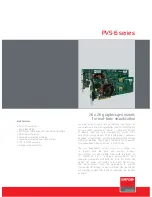
Correct Wiring of Electrically Isolated CAN Networks
6.3 Heavy Industrial Environment (
Double
Twisted Pair Cable)
6.3.1 General Rules
The following
general rules
for the CAN wiring with single shielded
double
twisted pair cable
should be followed:
1
A cable type with a wave impedance of about 120 Ω ±10% with an adequate conductor cross-section
(≥ 0.22 mm²) has to be used. The voltage drop over the wire has to be considered.
2
For heavy industrial environment use a four-wire CAN cable.
Connect
•
•
•
two twisted wires to the data signals (CAN_H, CAN_L) and
the other two twisted wires to the reference potential (CAN_GND) and
the cable shield to functional earth (FE) at least at one point.
3
The reference potential CAN_GND has to be connected to the functional earth (FE) at exactly
one
point.
4
A CAN bus line must not branch (exception: short cable stubs) and has to be terminated with the
characteristic impedance of the line (generally 120 Ω ±10%) at both ends (between the signals CAN_L
and CAN_H and
not
to CAN_GND).
5
Keep cable stubs as short as possible (l < 0.3 m).
6
Select a working combination of bit rate and cable length.
7
Keep away CAN cables from disturbing sources. If this can not be avoided, double shielded cables are
recommended.
Figure 7:
CAN wiring for heavy industrial environment
CAN-PCI/400
Hardware Manual • Doc. No.: C.2048.21 / Rev. 1.1
Page 21 of 29
CAN GND
CAN_L
CAN_H
CAN_GND
n.c.
n.c.
n.c.
n.c.
n.c.
n.c.
n.c.
n.c.
n.c.
n.c.
CAN_L
CAN_H
CAN_GND
Shield
CAN_GND
twisted
twisted
5
6
7
9
8
1
4
3
2
9
1
4
5
6
7
3
8
2
n.c.
n.c.
Single shielded
double twisted pair cable
(four-wire cable,
2x 2x 0.22mm²)
wire shield
Wire Layout
(Example)
Signal assignment of single shielded double twisted pair cable
with earth and termination
n.c. = not connected
DSUB9 connector
(female or male)
pin designation
connector case
DSUB9 connector
(female or male)
pin designation
CAN cable with connectors
connector case
earth (FE)









































